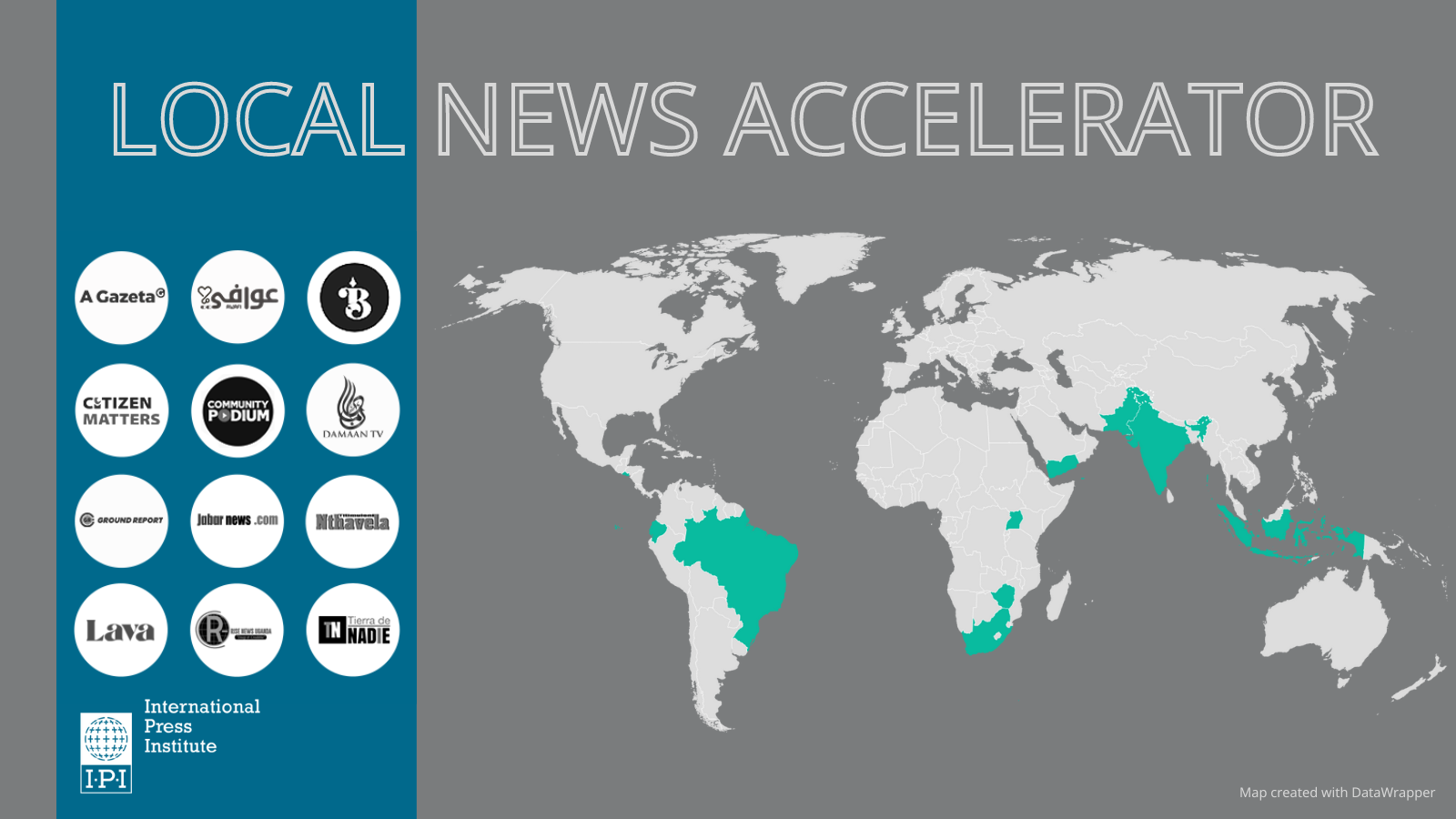Receive regular updates on IPI’s innovation and media sustainability work by subscribing to our newsletter, The Outlook: Media Innovation Unlocked.
Teams from 12 purpose-driven local media joined IPI’s Local News Accelerator to build their skills in newsroom management and media innovation.
From El Salvador to Zimbabwe, the newsrooms were selected from over 150 applicants. They included both established and startup media, all serving local or niche communities, with some focusing on specific topics such as climate change or health news.
“The accelerator journey has been transformative, shedding light on previously unrecognized challenges and equipping us with the tools to overcome them,” said the team from Ground Report, India.
Building strong business foundations
Many of these media were formed to fill a need or an information gap, but their teams hadn’t necessarily had the time or resources to flesh out their business plan.
It’s a problem also shared by many established local news media, given the need to ensure day-to-day operations and respond to varied external challenges. When it’s difficult for an outlet to merely keep the lights on, it’s hard to plan for future growth. The accelerator provided much-needed space to focus on getting the business fundamentals in place to prepare the way for a sutainable future.
“The first step was getting our house in order: we worked on an internal structure, defined roles, and assigned specific functions to team members,” explained Ecuador’s Tierra de Nadie.
Likewise for Yemeni health news site Awafi, whose team carries out crucial work in providing accurate, verified information about health news in a variety of formats – radio, print, online, video – and also supports local Yemeni reporters with journalistic training. But their work takes place in an environment of political repression, poor infrastructure and limited resources. Securing new sources of financial support is crucial in order to keep the project going.
The Awafi team were able to identify first steps for securing basic operational expenses, as part of the roadmap for growth they created during the accelerator.
Getting out of the local bubble
Through online meetings and group exercises, the accelerator had built-in opportunities to exchange experiences. In addition, each newsroom was partnered with a coach; one of three industry experts with experience directly relevant to the newsrooms’ own challenges.
Some of the participating teams operate in areas that are otherwise information deserts, and opportunities to meet peers are rare.
“The practical learning space from each other and testing of ideas enabled us to think outside the ‘Zimbabwe context box’ and harvest takeaways from what has worked in other countries,” the Community Podium team from Zimbabwe told us. “It was a great mutual learning experience.”
As well as the potential for innovation through collaboration and knowledge exchange, we hope that the networks built in the accelerator will provide the teams with ongoing peer support.
Implementing community-focused workflows
Through tools such as design thinking, IPI’s team and our carefully selected industry experts have worked with the newsrooms on strategies to bring audience members’ voices into their work. We supported the teams through the development of user research and feedback loops which suit their own communities and workflows.
Nthavela Newspaper, which writes in the Xitsonga language in South Africa, focuses very closely on the community of native speakers. They said: “Prior to our participation in the accelerator, we didn’t know how to gain a deeper understanding of the readers.”
Now the team is designing a reader survey and planning in-person focus groups with community members to ensure the publication becomes a useful educational tool.
Jabar News in Indonesia has already completed an audience survey inspired by the accelerator training, and responded to the findings by tweaking the way they work.
After hearing from over 100 residents in West Java, “we found that many rural residents, especially the younger generation, were apathetic towards politics and the election process,” explained the team.
They have been able to act on those insights by adapting the way they present politics reporting. This work began by including more explanatory and educational content, and the team is now developing plans to launch a local correspondent network.

Riana A Wangsadiredja, founder of Jabar News, with the team during an editorial meeting. Photo courtesy of Jabar News
Helping media tell their own stories
The participating newsrooms are operating in very different contexts, and the issues they face range from low literacy levels of their target audience to direct attacks on their media by authoritarian governments. One challenge they all share is securing funding, both to continue their current work and to put themselves on a path to growth.
Many of the accelerator participants are new media, grappling with the question of how to promote their work to gain not only new audiences but also funders and partners. Journalists might be storytellers by vocation, but telling their own story often comes less naturally.
To support the teams, the accelerator included training and practice in pitching, with each team getting the chance to develop their own pitch and receive feedback.
Community Podium, a participatory media in Zimbabwe, realized they had strong examples of the impact of their work, but did not have a clear strategy for sharing these publicly. They now plan to update their website and create a space for demonstrating the outcomes of their reporting for their communities. They are also among several teams who told us they have already implemented the feedback they received on their pitches from the IPI team, and are preparing new versions to present to possible donors.
Local News Accelerator participants
Tierra de Nadie, Ecuador
Citizen Matters, India
Proyecto Lava, El Salvador
Ground Report, India
Bollo.id, Indonesia
Jabarnews.com, Indonesia
Damaan TV, Pakistan
Nthavela Newspaper, South Africa
Rise News Uganda Network, Uganda
Awafi, Yemen
Community Podium, Zimbabwe
A Gazeta, Brazil
IPI’s Local News Accelerator is made possible with support from the Friedrich Naumann Foundation.




